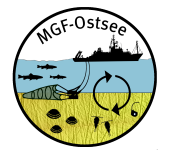Focus of Research
What is mobile bottom-contact fishing (MGF)?
In mobile bottom-contact fishing, equipment towed by a ship is used to fish the seabed and beam trawls are often used for this. However, these are not entirely unproblematic. Their otter boards, which serve to keep the net horizontally open, literally plow through the sediment on the seabed and thereby influence the organisms living in or on the seabed, but also have a significant effect on the sediment composition and sediment quality.
Issues and approaches
(1) How do protected areas (MPAs) develop after the exclusion of mobile bottom-contact fishing (MGF) with regard to benthic (pelagic) biocoenoses and biogeochemical conversions and material flows in the sediment-water boundary zone?
→ Monitoring before and after exclusion; comparison to reference area outside MPA
(2) What are the short- and long-term consequences of MGF on sediments, benthic biocoenoses and ecosystem processes?
→ Longer-term effects: Comparison of different areas
→ Short-medium-term effect: Experimental MGF transects (outside protected area): direct recording of effects on sediments and biota
Ecosystem components to be investigated
-Benthics/demersal fish fauna
-sediments (sedimentology, indication of trawl marks)
-Bentic food web (macrozoobenthos, meiofauna, microphytobenthos, protists, prokaryotes/microbial activity)
-biogeochemistry (storage potential, sediment-water fluxes, denitrification, remineralization, nutrient cycles)
What is the knowledge gain from this project?
-The importance of marine protected areas for the preservation of habitat-typical species communities, sediment functions and ecosystem processes in the Baltic Sea after MGF exclusion
→ Basis for recommendations for the management of nature reserves and longer-term goals
-Short- and medium-term effects of MGF on benthic communities and sediment functions in the Baltic Sea,
Overall evaluation: impact of MGF on the Baltic Sea ecosystem
→ Assessment of the extent to which MGF conflicts with EU goals on biodiversity, water quality, etc
-Knowledge of direct MGF effects (depending on fishing gear) vs. indirect effects (via damage to organisms) on important sediment functions
→ Recommendations for minimizing effects by selecting appropriate MGF techniques
-Basics to develop recommendations for an adapted, environmentally sound fishery for the Baltic Sea

